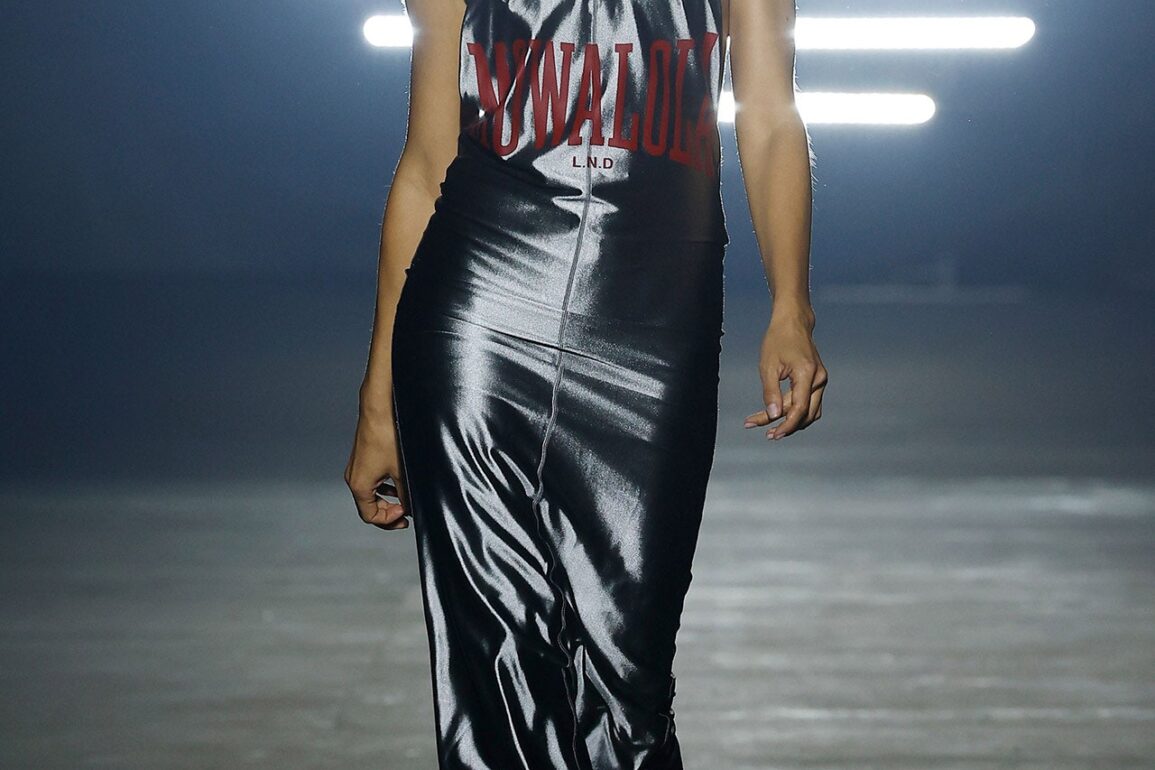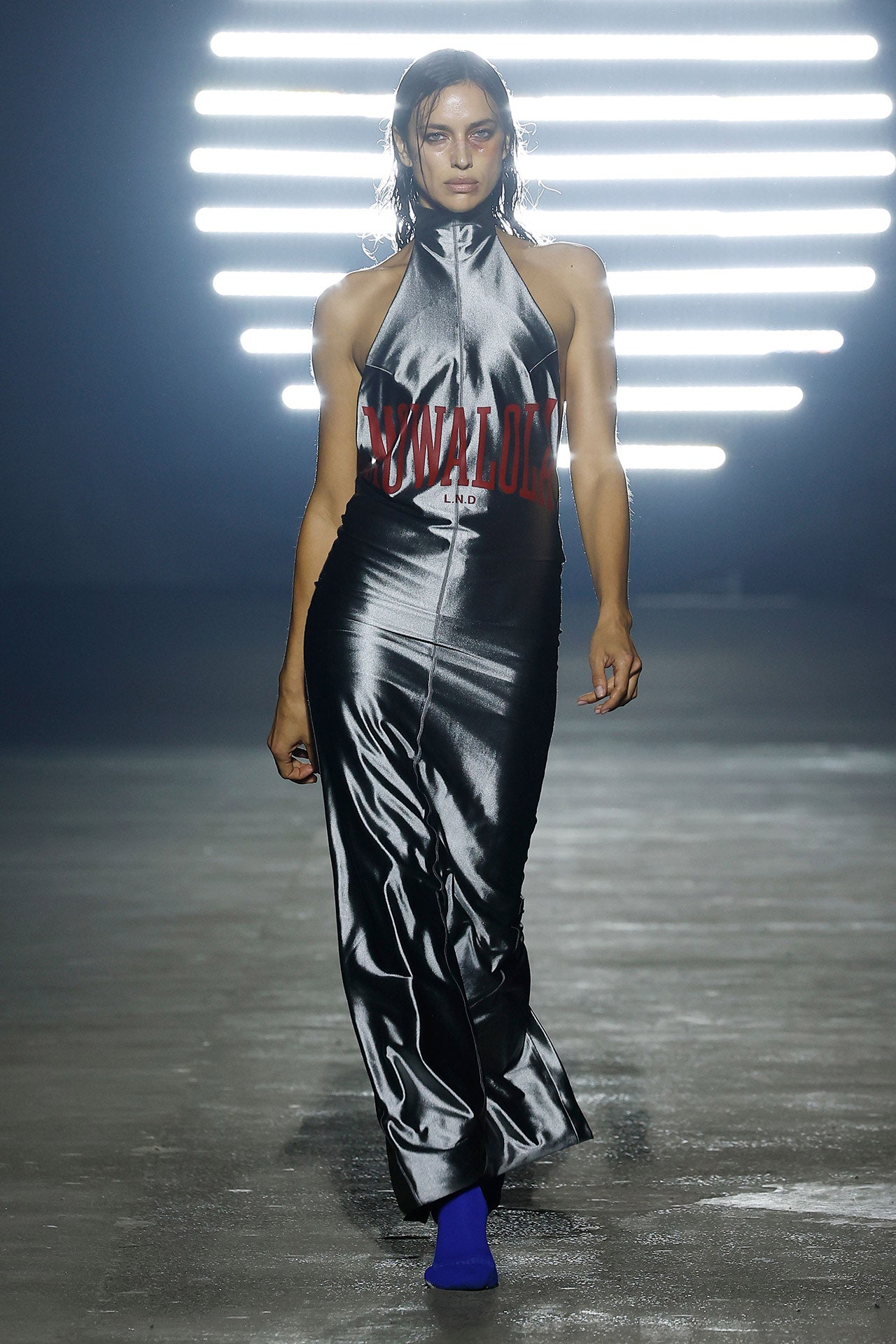This article references domestic violence.
At a time when male violence against women is – once again – dominating the news cycle, you’d be forgiven for hoping London Fashion Week might offer some reprieve. Alas, such hopes would soon be dashed when Irina Shayk walked down the catwalk during Mowalola’s SS24 show with a black eye and stitches across her nose.
The image garnered plenty of attention online, with Aisha Ali-Khan, a human rights campaigner and activist, tweeting, “Giving supermodels a fake black eye is absolutely reprehensible. What an insult to victims of domestic violence seeing injuries like this glamorised for public consumption.”
Mowalola Ogunlesi says the collection – worn by models with fake bruises, wounds, and scars – was inspired by the first time she saw the film Crash, telling Vogue Runway, “I was really excited by the fetishization of pain through crashing,” adding that she envisioned “a whole universe that resides on the street.”
She later tweeted several photos of the bruised models, saying, “We run from pain, but we need pain to survive.”
Renowned makeup artist Isamaya Ffrench worked on the look, sharing a close-up of the eye makeup on Instagram, describing it as “car crash dummy makeup.” Many people who commented on the post described it as “triggering”, with another accusing it of “glamorising abuse”.
Now, I firmly believe that art should make you feel something – even (or especially) if the primary feeling is one of discomfort. And Mowalola’s collection certainly fits the bill. But it’s not the ambitious critique of pain that disturbs me; it’s the unforgivable indifference towards domestic violence victims, whose pain is relentlessly fetishised as a means of generating controversy – not to mention the accompanying media coverage.
Raymond Lam, CEO and founder of fashion brand Vendula London tells GLAMOUR that violence against women and girls is an “ongoing tension” within the fashion industry, adding that “many designers have faced controversy over the years. Perhaps the most famous example, he says, is Alexander McQueen’s AW95 collection, named ‘Highland Rape’, which was slammed for appearing to romanticise sexual violence against women. McQueen later hit back at this interpretation, saying, “People were so unintelligent they thought this was about women being raped- yet Highland Rape was about England’s rape of Scotland.”
“Violence against women in fashion is also an issue outside of fashion shows, appearing in high fashion editorials and advertising,” explains Lam. He cites Dolce & Gabanna’s 2007 advert – known as the ‘gang rape’ advert – that was widely banned due to its depiction of a female model being pinned to the ground by a male model while others looked on. He also highlights a 2006 Jimmy Choo advert that depicts singer Quincy Jones sitting on the open boot of his car holding a spade, next to a female model seemingly positioned to look like a body. “Even though both of these adverts were published over ten years ago,” Lam explains, “The trend of depicting violence against women in fashion has sadly appeared to continue.”
The model’s cosmetic bruises weren’t the only controversy within Mowalola’s collection. The designer apologised following backlash over her use of Saudi Arabia’s flag on one of her miniskirt designs. She also faced accusations of fatphobia over one of the t-shirts in the collection, designed for two models to wear at once, which bared the slogan ‘4 Slim People’. After model Aaron Phillip questioned the garment online, Ogunlesi responded with, “[Your] rage is valid, but I will always be humorous,” before adding, “I flipped this Karl Lagerfeld 4 slim people tank top. It is funny to me because I [have] never seen any plus size on a Chanel runway & I never see this rage towards them.”
It’s certainly not any designer’s role to sanitise their art – nor is it expected that fashion collections should steer clear of controversial themes. Equally, their responsibility should be recognised. If a designer chooses to send one of the most beautiful women in the world down a catwalk with a cosmetically applied black eye, they must be prepared to grapple with the associated cultural baggage.
As Farah Nazeer, Chief Executive at Women’s Aid, commented, “A black eye is not a fashion accessory.
“Millions of people will be watching London Fashion Week shows, and anything that glamourises domestic abuse is damaging and offensive to survivors.”
GLAMOUR has reached out to representatives for Mowalola for a comment. This article will be kept updated.
For more information about emotional abuse and domestic abuse, you can call The Freephone National Domestic Abuse Helpline, run by Refuge on 0808 2000 247.
For more from Glamour UK’s Lucy Morgan, follow her on Instagram @lucyalexxandra.
This post was originally published on this site be sure to check out more of their content.








